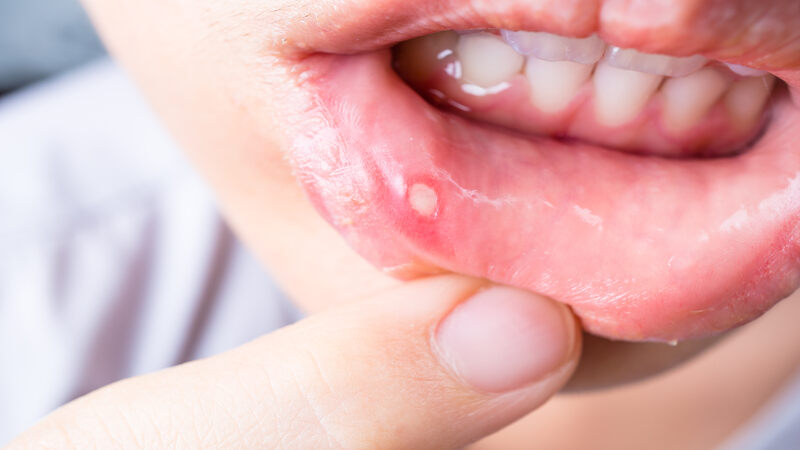
If you have a self experienced mouth ulcer, you probably know how painful it can be for your toddler. Mouth ulcer or canker sores is not entirely a grown up’s issue. Kids under the age of 10, though rarely, are also affected by this condition. Canker sores can make eating, talking difficult and even disrupt sleep.
Typically, sores go away after some time without any medication. However, in some cases, your toddler may face discomfort and require treatment to get relief from pain. To help you understand about canker sores, symptoms, causes, and treatment options, we’ve wrapped up this article with plenty of information.
What Are Canker Sores?
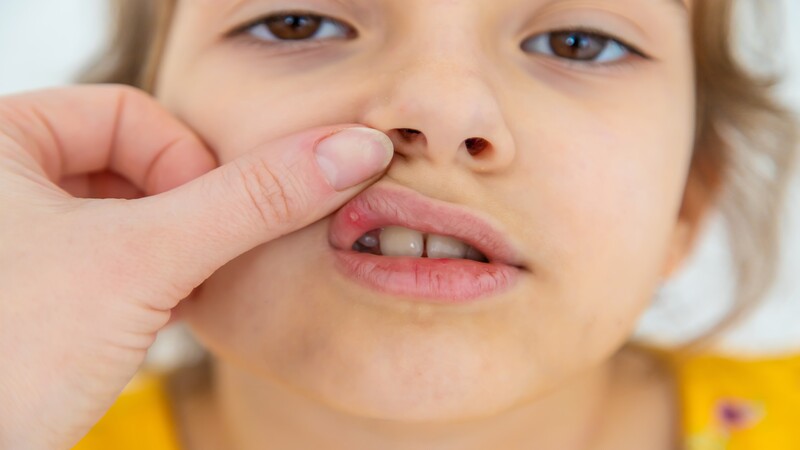
Canker sores, also called aphthous ulcers, are small white or yellow colored sores with a reddish ring or halo that appear under the cheeks and lips, under the tongue or at the base of the gum or even in soft palate (the fleshy part of the hard roof of the mouth (1).
Even though it is small in size, it can cause severe pain which makes eating and drinking challenging for your little one. Canker sores can cause no harm to toddlers. They generally last for a week or two and slowly heal on their own.
What Are The Symptoms of Canker Sores in Toddlers?
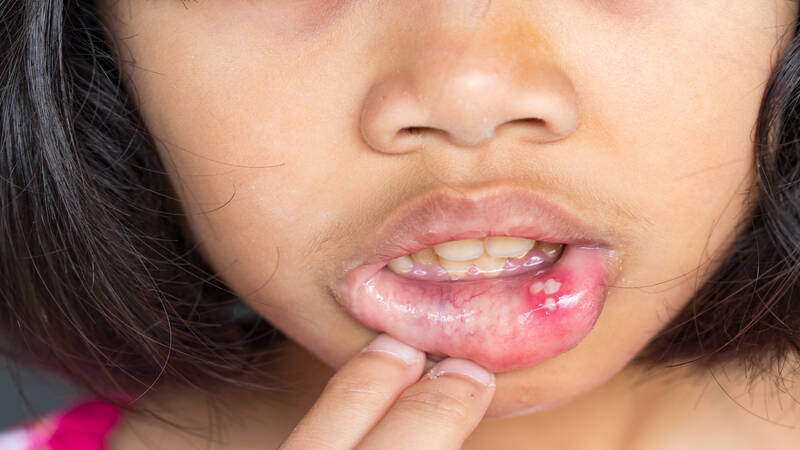
The symptoms of canker sores that may be observed in toddlers are:
- More often, shallow and small but painful open sores with a bright red border with the white, gray or yellow center
- Your child may mention tingling in the area few days prior to the appearance of the sore
- Though usually it appears individually, it can also appear in small clusters
- Children refuse to eat because of the pain and irritation caused by the sores
- Not accompanied by fever or swollen lymph nodes
What Causes Canker Sores?
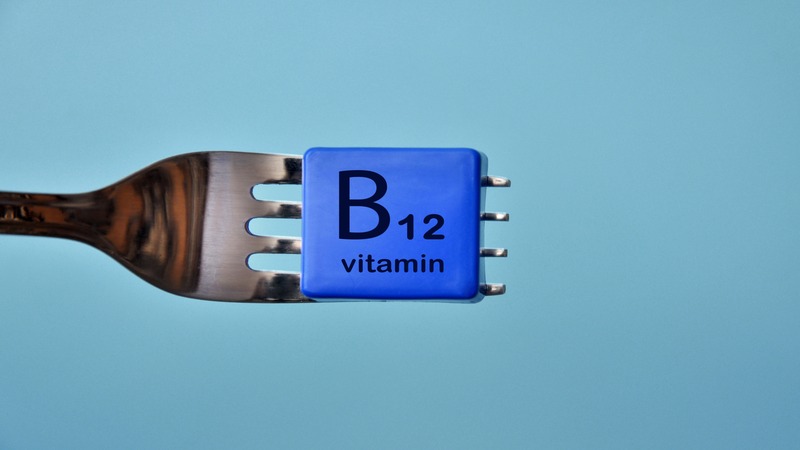
Specialists and scientists have not achieved a clear agreement on the reasons behind canker sores. In any case, there are several factors which can contribute to this condition. Some of these factors include:
- Food Allergies: Some toddlers who develop an allergy towards chocolates, eggs, citrus fruits like oranges and limes, fried and spicy food, dairy products, etc. are sometimes found to develop canker sores (2)
- Nutritional Deficiencies: Kids who suffer from some nutritional deficiency of specific vitamins such as iron, folic acid, zinc, or vitamin B-12 are found to develop canker sore more frequently (3a).
- Mouth Injuries: Some kind of trauma or injury such as biting accidentally inside the mouth can also bring in canker sores (4a).
- Emotional Stress: Toddlers undergoing some kind of emotional stress are found to develop the canker sores
- Immune System: Toddlers with weak or overreacting immune systems are also found to get canker sores (5).
- Viral Infections: A kid who has just recovered from some viral infections are found to develop canker sores (4b).
- Genetic Reason: Sometimes canker sores tend to run in the family indicating the genetic reasons (3b).
- Drug Reaction: Recurring canker sores are more often linked with the reaction of some medicines that the kid may have taken.
- Toothpaste And Mouthwashes: Sodium lauryl sulfate (SLS) is an ingredient in many kinds of toothpaste and mouthwashes. This is a cause found behind many cases of canker sores and it can also increase the healing time of the sores (6).
- Hard Brushing: Brushing teeth hard enough to damage the delicate lining of the mouth can trigger canker sores
- Crohn’s Disease: This is an inflammatory bowel disease (IBD) causing the inflammation of the lining of the gastrointestinal tract anywhere between mouth to anus. If a kid has this disease, occasionally, they can develop a canker sore (7).
- Behcet’s Disease: It is a rare disorder which causes the inflammation of the blood vessels throughout the body. Mouth sores are common in cases of Behcet’s disease.
Is Canker Sores Contagious?
Canker sores are not caused by any harmful microbes (like virus) and hence are not contagious. They can however be irritating and painful but you cannot catch it from someone who has them.
When to Seek Medical Help For Canker Sores in Toddler?

You should take your toddler to consult the doctor if:
- The sores are larger and deeper and don’t even start to heal or don’t show any decrease in the pain in spite of giving home remedies for more than 10 days
- In case more sores appear before the first sore is healed
- If the toddler develops a fever
- Swelling in lymph nodes
- If the sores appears more than three to four times a year
What is The Difference Between Canker Sores And Cold Sores?
People often confuse cold sores and canker sores with each other. Both are totally different issues. It is important to understand the difference between canker sores and cold sores to take the proper treatment. Some of the common differences between canker sores and cold sores are:
| Canker Sores | Cold Sores |
|---|---|
| Develops inside the mouth and on gums | Develops outside the mouth more often on or around the lips |
| Pain inside the mouth especially while eating and drinking | Pain around the mouth or on the affected area |
| Non-contagious | Contagious |
| The cause is not clearly defined | Caused due to herpes simplex virus |
| Appear as small, white or yellow open sores surrounded by a reddish ring. Can be single or in groups | Appears as red fluid filled blisters and are typically found in groups |
| Quicker healing is possible in most cases without the treatment of any kind | As the blisters are extremely painful and go away only very slowly if left alone, treatment is required |
How to Prevent Canker Sores in Toddlers?
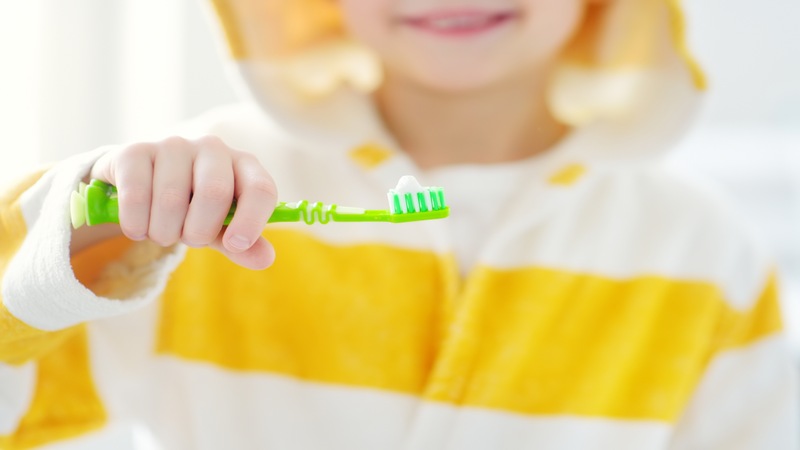
You can reduce the chances of your toddler getting canker sores by:
- Switching the toothpaste used by your toddler (if it contains the foaming agent sodium lauryl sulfate) with the toothpaste which is free from SLS
- Avoiding or reducing acidic and spicy food from the menu and aerated soft drinks which can trigger the sores and are not healthy otherwise too
- Give the toddler a soft bristled toothbrush. Also, ask them (or make them) not to brush too hard as it can damage the inner lining of their mouth
- Make sure your toddler is having nourishing food
How to Treat Canker Sores in Toddlers?
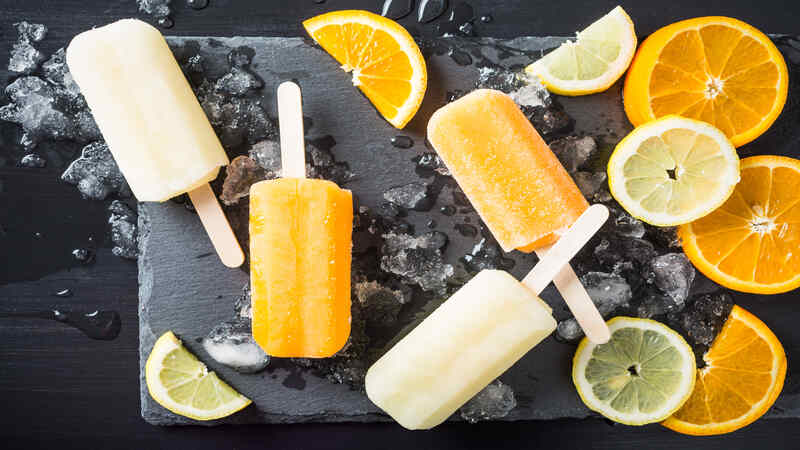
If you avoid the food items that can aggravate the sores (never give them hot food), that alone is a good treatment. Applying ice on the sore helps to numb the area and thus the pain. Giving them ice pops can also help in reducing the pain.
Most of the canker sores in the toddlers usually go away within a week or two without any treatment. Definitely (if there are no underlying problems) the intense pain will reduce progressively within 4 to 5 days. If the sore is causing immense pain, that the kid is unable to eat or drink properly, then the doctor-
- May apply teething cream directly to the sore so that the area becomes numb which allows the toddler to eat and drink without much pain
- Sometimes, depending on the severity the doctor may prescribe some mild pain relievers
Canker sores are extremely painful and are very common in kids. In most cases, canker sores heal on their own. However, in case your toddler gets these sores frequently and causes intense pain, it is good to visit a doctor for appropriate treatment. In addition to medical assistance, encourage your toddler to follow good hygiene practices. You can provide OTC medication for pain management on doctor’s recommendation. Also, keep a check on the symptoms to help doctors understand the severity and get the right medication.
FAQ’s
1. What Vitamin Deficiency Causes Canker Sores?
Canker sores can also occur due to the deficiency of vitamin B1 (thiamine), B2 (riboflavin), B6 (pyridoxine) and B12.
2. Does Vitamin C Stop Canker Sores?
There are several over-the-counter medicines available to treat canker sores. However, supplementing with vitamin C can be helpful to heal canker sores faster. In addition to vitamin C, zinc can also help to heal canker sores.
3. What to Feed a Toddler With Mouth Ulcers?
When your little one is suffering from mouth ulcers, you can feed them soups, bland food, pancakes, mashed potatoes, waffles, oatmeal, macaroni, cottage cheese, scrambled eggs etc. Greek yogurt, sauteed vegetables and tofu are also great options. However, try not to feed them with steaming hot food or extra spicy delights as it can cause burning sensation and affect healing of ulcers.
4. Can You Put Salt Directly on a Canker Sore?
No, you should avoid putting salt directly on the canker sore as it can worsen the pain and cause irritation on the affected areas of the mouth. Instead of putting salt directly, use salt water solution to reduce inflammation.
References
- InformedHealth.org [Internet]. Cologne, Germany: Institute for Quality and Efficiency in Health Care (IQWiG); 2006-. Canker sores (mouth ulcers): Learn More – What can you do if you have a canker sore? [Updated 2022 Oct 17]. – https://www.ncbi.nlm.nih.gov/books/NBK546251/
- Valley Ridge Dental Centre – https://www.valleyridgedentalcentre.com/foods-that-cause-mouth-ulcers/
- Plewa MC, Chatterjee K. Recurrent Aphthous Stomatitis. [Updated 2023 Nov 13]. In: StatPearls [Internet]. Treasure Island (FL): StatPearls Publishing; 2024 Jan-. – https://www.ncbi.nlm.nih.gov/books/NBK431059/
- Oral Health Foundation – https://www.dentalhealth.org/mouth-ulcers
- Cedars-Sinai – https://www.cedars-sinai.org/health-library/diseases-and-conditions—pediatrics/c/canker-sores-aphthous-ulcers-in-children.html
- Seaglass Dental Care – https://seaglassdentalcare.com/why-does-my-toothpaste-give-me-mouth-sores/
- Eckel A, Lee D, Deutsch G, Maxin A, Oda D. Oral manifestations as the first presenting sign of Crohn’s disease in a pediatric patient. J Clin Exp Dent. 2017 Jul 1;9(7):e934-e938. doi: 10.4317/jced.53914. PMID: 28828164; PMCID: PMC5549595. – https://www.ncbi.nlm.nih.gov/pmc/articles/PMC5549595/

